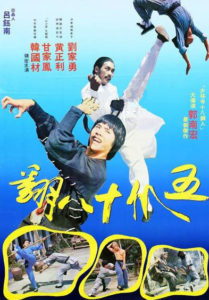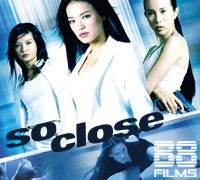Director: Joseph Kuo
Cast: Lau Kar Yung, Hwang Jang Lee, Wong Biu Chan, Yuen Qiu, Hon Gwok Choi, Chan Lau, Chu Tiet Wo, Lau Hok Nin, Sham Chin Bo, Wong Chi Wai, Got Ping
Running Time: 91 min.
By Paul Bramhall
The kung fu genre had a pretty tough act to follow in 1979, following a year which gave us such timeless classics as Drunken Master, Warriors Two, and Heroes of the East. Thankfully kung fu talent was in plentiful supply, and arguably the whole of the late 70’s and early 80’s period is responsible for creating some of the greatest kung fu movies of all time. While studios like Golden Harvest, Seasonal Films, and Shaw Brothers continued to be the big hitters, the independent scene was also cranking out plenty of classics around the same time as well. One name which is synonymous with the independent kung fu movie, is director, writer, and producer Joseph Kuo.
By 1979 Kuo had already been directing movies for over 20 years, however in the mid-70’s he struck up a particularly illustrious partnership with Carter Wong, who became his go-to leading man. Between 1976 – 1978 Kuo and Wong would collaborate as director and star on The Blazing Temple, The 18 Bronzemen and its sequel, The Eight Masters, The Shaolin Brothers, and Born Invincible, however with the 80’s looming, Kuo spent the final 12 months of the 70’s looking for his next leading man. Enter Lau Ga-Yung, a relatively fresh face who came with the esteemed connection of being Lau Kar-Leung’s nephew, and had up until this point featured in a handful of supporting roles. He made his screen debut as the noodle stall assistant in Kar-Leung’s directorial debut The Spiritual Boxer in 1975, and can be spotted in a small role alongside fellow Lau clan member Lau Kar-Wing in 1978’s Dirty Tiger, Crazy Frog.
It was 1979 that really gave him his chance to shine though, when Kuo cast him as the lead in Dragon’s Claws, and then later in the year The Fearless Duo. In an era which was full of attempting to cast talented stuntmen and choreographers as the next big thing (the following year would give us Yuen Tak in The Master, Mars in Lackey and the Lady Tiger, and Blackie Ko in Master Killers), Ga-Yung set the trend by proving it takes more than just screen fighting prowess to carry a movie, and was back to playing supporting roles within a couple of years. Personally, I’ll always know him as the guy that directed the 1990 modern-day actioner New Kids in Town, which gives us one of the rare opportunities to see Lau Kar-Leung unleash in a contemporary setting minus any comedy trappings.
Some sources say Dragon’s Claws was originally written with Jackie Chan in mind, however considering he and Kuo were rarely in the same circles, it seems more likely that Kuo’s movie is one of the many inspired by Chan’s collaborations with Yuen Woo-Ping. With that being said, Kuo was able to secure the villain from the previous years Snake in the Eagle’s Shadow and Drunken Master in the form of Korean superkicker Hwang Jang Lee (who’d notably go on to further collaborate with Kuo on The 36 Deadly Styles and again opposite Ga-Yung in The Fearless Duo, both from the same year). Jang Lee would spend most of the next 5 years playing kung fu movie villains, often barely clocking in any screen time until the prerequisite finale, however here he thankfully has a little more to do.
The story, for a kung fu movie, is surprisingly dark in tone if not execution. Ga-Yung plays the mischievous son of a kung fu master that runs the Dragon Boxing sect school. Played by Lau Hok-Nin (The Boxer from the Temple, Hell’s Windstaff), he runs the school with support from his wife, played by fellow old-school kung fu luminary Yuen Qiu (Dragon, The Young Master, Kung Fu Hustle). Their lives are interrupted by the arrival of Hwang Jang Lee, who’s returned from a self-imposed exile in Manchuria to claim the seal of the school and take over. So far, so the usual old-school kung fu movie tropes.
Where Dragon’s Claws differentiates itself, is that it’s revealed that Jang Lee and Qiu used to be lovers, however Qiu has spent the last 18 years trying to make it work with Hok-Nin, after he raped her and she fell pregnant with who’d grow up to become Ga-Yung. Hok-Nin’s health has been slowly failing over the years, since Qiu hit him with the deadly Dragon’s Claw strike during their altercation, however as she doesn’t want Ga-Yung to be fatherless, it’s a burden she’s been willing to endure. The story may be reflective of Kuo’s more dramatic martial arts themed work like 1969’s King of Kings, however onscreen it carries little impact, with the nature of the events surrounding the narrative delivered via straight faced exposition, robbing the revelations of carrying any emotional weight.
Jang Lee should be a conflicted antagonist whose past has made him the villain he is today, tortured by the way he lost the love of his life in the cruellest of circumstances, but onscreen, well, he’s Hwang Jang Lee. He looks angry, reels of a number of villainous spiels about wanting to take over the school, and wipes the floor with everyone. The story may be understood, but it’s definitely not felt, which somehow feels like a missed opportunity. With that being said, it’s still a 1979 kung fu flick with Hwang Jang Lee, so it’s also fair to say there probably won’t be too many kung fu fans out there complaining about the lack of emotional range in his acting. Here he primarily uses the Dragon’s Claw style when he springs into action, before utilising his kicks whenever he needs a little assistance from his feet to defeat whoever he’s fighting against, his footwork revealed in the plot to be a style he acquired whilst in Manchuria.
He’s accompanied by a couple of henchmen, hilariously called the Green Monster and Red Monster. Played by Chan Lau (The Dragon, The Hero, Kung Fu Zombie) and Chu Tit-Wo (Crystal Fist, Blood Child), while there’s nothing particularly green or red about them, they bring a welcome dose of extra kung fu goodness to proceedings, and the pair have a couple of solid fight scenes. Ga-Yung himself is on point in the fighting department. He spends a portion of the movie under the tutelage of an old beggar, who can best be described as a knock-off Sam Seed, and is played by Pak Sha-Lik (The 36 Deadly Styles, Tales of a Eunuch). Unfortunately Sha-Lik has neither the charm nor grace of Simon Yuen, so scenes which replicate the tandem style of fighting from the likes of Snake in the Eagle’s Shadow, where Sha-Lik controls the movement of Ga-Yung, come across as rather clunky and uninspired.
Sha-Lik is also responsible for the majority of the tortuous comedy that springs up in Dragon’s Claws. None more so than that infamous old-school kung fu trope, the gag involving kids pee! Let’s face it, to watch an old-school kung fu comedy you develop some immunity to these poorly aged shenanigans, but here even I felt a little uncomfortable. Apart from getting peed in the face, we get a whole scene dedicated to Sha-Lik lining up a group of kids, telling them to pull their pants down, and then requesting that they pee into a pot several meters away with the promise of a treat for whoever can get theirs in. To make things a little more awkward, he then sits right next to the pot practically asking to get soaked. It’s as uncomfortable to watch onscreen as it probably feels to read.
Thankfully, like so many kung fu movies of the era, Dragon’s Claws populates its closing reel with the kung fu. Yuen Qiu throws down against Chan Lau and Chu Tit-Wo, as does Ga-Yung, before events culminate in the expected showdown between Ga-Yung and Hwang Jang Lee. It’s a worthy finale, and while many kung fu flicks that featured Jang Lee as the villain would see him abruptly defeated in less than convincing style, here Ga-Yung is entirely believable in being able to get the better of the Korean super-kicker.
Choreographed by Max Lee Chiu-Chun, Dragon’s Claws was the first partnership with Kuo as director and fight choreographer, and the pair would continue to work together on The 36 Deadly Styles, The Unbeaten 28, and Shaolin Temple Strikes Back. Together with Kuo’s talent for being able to connect his protagonists’ trainings with how they defeat their final adversary, Dragon’s Claws proves to be one of the best examples of this, resulting in a satisfying finale which doesn’t make Sha-Lik’s presence a waste of time. While it’s unlikely to appear in many discussions on the best kung fu movies of the era, as an unfussy dose of old-school kung fu which knows how to utilise the talents of its cast, Dragon’s Claws delivers how you’d expect it to, it’s just difficult to shake the feeling that it could have been much more.
Paul Bramhall’s Rating: 5.5/10





Potentilally decent film ruined by stupid comedy.